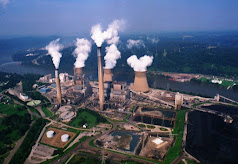The bill was amended in a party line vote-- Republicans supporting-- to make a one-time $250 million allocation from the federal COVID Response Restricted Account to the Commonwealth Financing Authority for these purposes--
-- $125 million for research, development, construction or site development of carbon dioxide and methane reduction technologies, including carbon capture, micro-grid nuclear power plants, sequestration and hydrogen fuel projects. At least $12.5 million is to be used for methane abatement projects from plugging abandoned gas wells.
-- $62.5 million for sewer and water infrastructure and stormwater mitigation, including riparian planting for carbon dioxide reduction, stream buffering and streambank restoration.
-- $62.5 million for assisting workers and communities impacted by electric generation or manufacturing plant closures, including training projects, extended unemployment benefits and investments in projects to redevelop the closed plant sites.
The amended bill is being held in Committee by Republicans as a possible compromise on the RGGI regulations that they can point to as a way to solve the pollution problems caused by coal-fired power plants.
The significance of this proposal is that it is the first time House or Senate Republicans have recognized a need to reduce carbon pollution from coal-fired power plants and to help communities and workers caught in the transition to the new clean energy economy.
Over the last decade 19 coal-fired power plants shutdown as a result of competition from natural gas, yet the communities and workers were left on their own to deal with the consequences by the people that presently run the General Assembly.
There are now only three conventional coal-fired power plants left in Pennsylvania that have not announced plans to retire or stop burning coal. Read more here.
In his budget address in 2021, Gov. Wolf proposed to create an Energy Communities Trust Fund funded by the RGGI auction proceeds to provide direct support to dislocated workers and communities experiencing impacts from the closure of existing power plants. Read more here.
But, the proposal went nowhere due to opposition from the people that presently run the General Assembly.
In July of last year, Sen. Carolyn Comitta (D-Chester), Minority Chair of the Senate Environmental Resources and Energy Committee, introduced Senate Bill 15 to implement the Energy Communities Trust Fund concept. Read more here
A companion bill was introduced in the House-- House Bill 1565 (Herrin-D-Chester).
The legislation will establish several funds to disburse the estimated $300 million or more in annual revenue generated through future RGGI auctions--
-- 37.5 percent to the Energy Communities Trust Fund;
-- 12.5 percent to the Environmental Justice Communities Trust Fund;
-- 46 percent to the Clean Air Fund divided as follows--
-- 56 percent to the Greenhouse Gas Abatement, Energy Efficiency, and Clean and Renewable Energy Investments Account
-- 44 percent to the Commercial and Industrial Energy Efficiency Account;
-- 4 percent for administration of the program.
Neither bill went anywhere.
The House Republican proposal is an attempt to get a few more House Democrats to oppose the RGGI regulations and overcome an expected veto of the bill by Gov. Wolf.
The proposal also responds to poll after poll showing widespread support in Pennsylvania to deal with climate change and help communities in transition to clean energy. Read more here.
While it is a one-time proposal that is much more limited approach than the RGGI regulations and Senate Bill 15 and House Bill 1565 and Sen. Street’s Senate Bill 979 clean energy standard, it is a small step forward in recognizing climate change is real by PA Republicans.
Related Articles:
-- PA Conservative Energy Forum: 68% Of Voters Support Candidates Who Back Clean Energy
-- New Poll Finds 72% Of PA Voters Want Government To Prioritize Clean Energy In Economic Stimulus
[Posted: February 14, 2022] PA Environment Digest


No comments :
Post a Comment